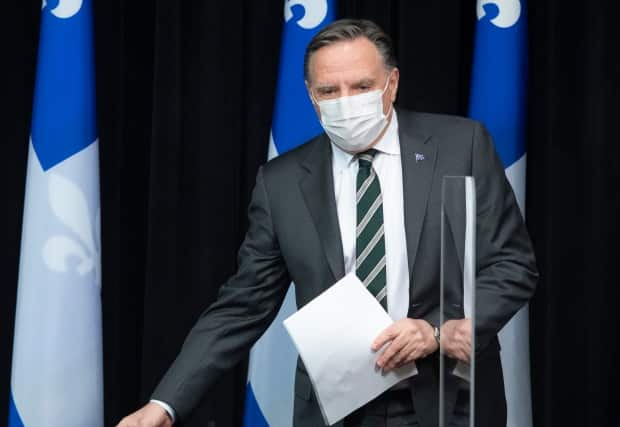Quebec imposes curfew, closes restaurant dining rooms and further delays return to school

Quebec is once again imposing a curfew in an effort to curb the spread of the highly contagious Omicron variant, as well as closing restaurant dining rooms, delaying the reopening of schools and closing non-essential businesses on Sundays.
Indoor gatherings involving more than one household bubble will also be prohibited.
Premier François Legault made the announcement in a news conference this evening, alongside Health Minster Christian Dubé and public health director Horacio Arruda.
The new restrictions will take effect Friday at 5 p.m.
"We're at the worst of the pandemic so far," Legault said. "Cases are underevaluated due to [at home] rapid tests, and we risk surpassing hospital capacity in the coming weeks."
People who do not have a valid reason for being out of their homes between the hours of 10 p.m. and 5 a.m. risk a fine of between $1,000 and $6,000, said Legault. He did not announce an end date for the curfew, but said it would be the first restriction to be removed once the situation has improved.
Quebec reported 14,188 new COVID-19 cases Thursday, its highest number of confirmed daily cases since the start of the pandemic.
All schools will remain closed until Jan. 17, but will provide remote learning where possible. School daycare services will remain open, prioritizing the children of health-care workers.
Most stores will be closed on Sundays, with the exception of certain businesses such as convenience stores, gas stations and pharmacies.
Indoor sports are suspended, unless practised by a single person, by two people or by occupants of the same residence.
Indoor facilities at ski hills will be open only to allow people to warm up and have access to bathrooms. No food will be served indoors, though takeout will be permitted.
Places of worship must also close, except for funerals with up to 25 people in attendance.
COVID-19 hospitalizations in Quebec
Projections released by Quebec's national health-care research institute, the Institut national d'excellence en santé et en services sociaux (INESSS), show the number of hospitalizations could reach between 1,600 and 2,100 in a matter of three weeks.
Dubé said the projections were "exactly what we expected, though we would have preferred better."
The current hospital capacity for treating COVID-19 patients across the province is at 1,252, according to the latest data dashboard published by the Health Ministry on Twitter. The capacity has gone up by a few hundred beds, as several elective surgeries and other non-urgent procedures are being delayed or cancelled to free up staff.
Thursday, there were 939 people in hospital with the disease, including 138 in intensive care. The INESSS projections predict that the number of people in intensive care could rise to 375 in three weeks. Right now, the capacity for intensive care beds for COVID-19 is at 319.

Earlier this week, Dubé announced that some health-care workers who tested positive for COVID-19 or were in close contact with a case were being allowed to stay on the job.
Legault noted that though roughly 10 per cent of Quebecers are not vaccinated, they represent 50 per cent of those in hospital.
He said he is looking into expanding the use of vaccine passports in the province and has asked his government to work on applying it wherever legally possible.
Lack of data supporting use of curfew
Benoit Barbeau, a virologist in the department of biological sciences at the Université du Québec à Montréal, said earlier Thursday he was concerned that imposing a curfew just before New Year's Eve would only have the effect of discouraging Quebecers.
"It would be extremely difficult for Quebecers to accept that kind of demand," Barbeau said, suggesting that if the government is to go ahead with such a measure to do so after Jan. 1, to have a better chance of people following it.
Barbeau said there is a lack of data showing just how much a curfew curbs transmission, if at all.
Instead, the virologist said the focus should be on reducing capacity in businesses and restaurants, and to delay the return to classes after the holiday break.
WATCH | Quebec announces strict new measures amid rising Omicron infections:
Quebec's Health Ministry sent journalists a news release Thursday evening claiming the decision to reinstate the curfew was backed by science. It shared three preliminary studies examining the effects of curfews in France, Jordan and Quebec.
The study looking into the effects of the curfew in Quebec was conducted by a Public Health Ontario team and compared the impact of lockdown restrictions in Quebec and Ontario, which did not impose a nighttime curfew, on the amount mobility happening in both places.
The study found that an overnight curfew was effective at reducing people's movements at night by 31 per cent in Quebec and 39 per cent in Montreal. It did not examine the impact on virus transmission.
"This natural experiment among two neighbouring provinces provides useful evidence that curfews lead to an immediate and substantial decrease nighttime mobility, particularly in these provinces' largest urban areas hardest hit by COVID-19," the study said.
When asked about studies supporting the use of a curfew, Legault replied that it was common sense that the mandate would reduce evening trips and discourage people from gathering in their homes, where many have caught the virus.


